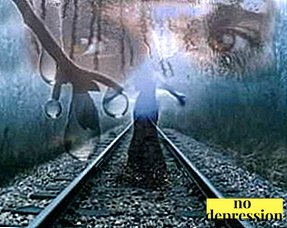Man is a complex phenomenon, therefore it is also not easy to engage in his typing. In addition to racial or national differences, there are a large number of individual characteristics due to the psyche. In addition to temperaments, known from school, there are other types of people. They may be based on the characteristics of the character, behavior, etc. Do you need this typology? Why bother to know your type and determine who the interviewee is? What benefits can it bring? Immerse yourself in the psychological classification.
Why divide people into types
Communication or communication is one of the main evolutionary devices that allowed humans to rise above other animals. The importance of this process is difficult to overestimate. But in order to communicate correctly, it is necessary to understand with whom and what can we talk about. It makes no sense to ask an egoist for help, discuss the peculiarities of public speaking with an introvert, or try to “draw out” the hypocrite in the spiritual conversation. The type of person imposes a significant imprint on his worldview, manner of communication.
The importance of the issue caused the emergence of a separate discipline dealing with the division of people by type - differential psychology. Scientists have learned to predict the compatibility of various types. It is not uncommon for people to take into account psycho-types during employment, when looking for a sexual partner, or trying to make friends with someone. To absolutize this approach is not worth it, but there really is a rational grain in it.
Invented many ways to classify a person. Generally, we note that the popular and running are not distinguished by a large number of types. Indeed, the more complex the classification, the more time is needed to study it, the more difficult it is to apply it in practice. So, consider what attempts have been made.
Psychological classification of people
When the first types of people were discovered, psychology as a science has not yet been invented. This happened long before the appearance of the scientific picture of the world. The ancient Greeks traditionally carry the palm.
One of the first to think about the existence of various types of people was the philosopher Empedocles. The basis of his classification formed the four elements that filled all things: earth, water, air, fire.
The number four is included in most other typologies of the time. So, the legendary doctor Hippocrates suggested these types of people, more precisely temperaments:
- sanguine persons;
- melancholic;
- phlegmatic;
- choleric.
The doctrine was further developed in the works of the ancient Roman doctor Galena. For a long time, this psychological classification dominated the minds of the world community. You can learn your temperament in the test on our website.
There have been other attempts at typing, for example, by social activity or social role. One of the fathers of classical philosophy Plato singled out such types of his contemporaries:
- Normal - distinguished by a developed spirituality and morality;
- Democratic - characterized by moral instability;
- Timocratic - ambitious, seeking to fight;
- Tyrannical - subject to the influence of animal instincts;
- Oligarchic - discreet and thrifty type of people.
This classification reflected not only the value system of an individual, but also described the dominant pattern in society.
New powerful impetus to the separation of psychological types occurred after many centuries. This was facilitated by scientific discoveries that previously simply were not available to humanity.
Swiss psychologist Karl Gustav Jung based on the desire of a person to interact with the world. Thus, he proposed the following types of people:
- Extroverts are communication oriented;
- Introverts - focused on their inner world.
In turn, in each of these personality types there are four subtypes:
- Sensory;
- Intuitive;
- Thoughtful;
- Emotional.
Thus, it was allocated eight types of people, which are partially correlated with the ancient Greek ideas about temperaments.
German psychologist and philosopher Edward Spranger took as a basis value orientations. He singled out six basic "life forms" of man:
- Theoretical - learns the world, seeks to understand it;
- Religious - is in a state of spiritual search;
- Social - needs to be accepted by society;
- Political - seeks power;
- Economic - trying to gain;
- Aesthetic - embodies his impressions in the form.
One of the most extensive and detailed classifications taking into account psycho-types is presented in socionics. This doctrine was created by the Lithuanian economist Aushra Augustinavichiute, who combined her knowledge of psychology and sociology. She developed a popular theory describing 16 sociotypes, named after historical figures or literary characters:
- Balzac - inclined to constructive criticism;
- Gaben - strives for comfort and harmony;
- Hamlet - creates an emotional atmosphere;
- Huxley - different curiosity and fantasy;
- Hugo - overflowed with energy, positive emotions;
- Jack London - efficiently uses available resources;
- Don Quixote - struggles with stereotyped thinking;
- Dostoevsky - different education and tact;
- Dreiser - lives according to strict moral principles;
- Dumas - prone to subjective perception of the world;
- Yesenin - can predict, "feel" the moment;
- Zhukov - resolutely moves towards the target;
- Maksim Gorky - able to think rationally;
- Napoleon - looking for an opportunity to demonstrate its strength;
- Robespierre - distinguished by justice and responsibility;
- Stirlitz - can well organize his and others work.
These psycho-types, although they are male, are equally suitable for women, describing generalized personal qualities.
An even more exotic approach is called the enneagram. Its inventors Oscar Ichazo, Claudio Naranjo, Georgy Gurzhiev, identified nine types of personality (enneatypes), based on their worldview, motivations, fears, desires and virtues:
- Boss - seeks to lead and does not like to obey;
- Reach - wants to be the best;
- Maverick - wants to be himself;
- Peacemaker - avoids conflicts, smoothes situations;
- Observer - prefers to move away from events;
- Perfectionist - focused on achieving the ideal;
- Assistant - tend to try for others;
- Skeptic - doubts and seeking support;
- Enthusiast - different persistence and vigor.
The ancient Greek tendency to divide humanity into four types has received a new development in the behavioral model DISC. This approach is based on different styles of human behavior:
- Dominant (Dominance) - resolute, rectilinear, self-confident;
- Influencing (Influence) - cheerful, sociable, optimistic;
- Constant (Steadiness) - soft, patient, calm;
- Corresponding (Compliance) - accurate, tidy, diplomatic.
There are other systems that describe the types of people, but they are more specific and specific.
Despite the fact that all people are equal, there are a number of differences in the field of psychology. It helps to identify types of people, which makes communication between them much easier. Popular are those approaches that allow you to get to know yourself and your interlocutor better without the need for long-term theoretical training. From the axiomatic division into introverts and extroverts, to a more complex socionic model.



